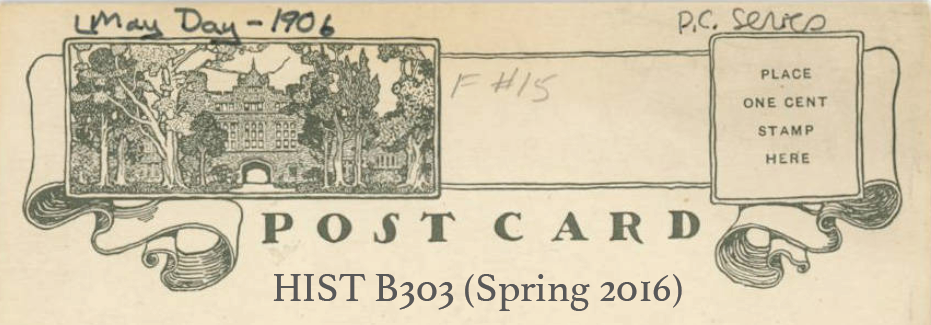The idea that World War II is one of the most “popular” events in history does not come as a surprise to me. Even in the history senior thesis seminar this past year, I think at least three people (maybe four?) wrote their theses on something that had to do with Nazi Germany, and if it’s that prevalent within the discipline, well…
I think one of the reasons for the popularity of this event in American pop culture is that it’s often viewed as a black-and-white moral event: Nazis = bad, Americans = good. Rebecca Onion comments on this in her article on popular, “historical” Twitter accounts: “Tweets of a liberated concentration-camp survivor holding a German at gunpoint are easily shareable: Everyone knows what side to be on.” It’s an event that Americans often see themselves as having reckoned with– we conquered evil by any means necessary, and here we’re unquestionably the good guys (a stance more difficult to take with World War I, the Civil War, the Vietnam War, the Spanish American War, the Gulf War, the Korean War… pretty much any other war, really, except maybe the Revolutionary War). This vision often collapses under too much scrutiny (amazing, isn’t it, that the Americans played dirty too?) and is a source of discomfort for many Americans, “victims” (Jewish Americans, e.g.) and “enemies” (Japanese Americans, e.g.) alike. Our current master narrative of WWII, perhaps even more so than other wars, does not allow for nuances.
How exactly does this relate back to archives and the issue of history in the digital age? To begin with, it got me thinking about a number of the claims in Rosenzweig’s article, particularly his comment about how digital history is forcing historians to reconsider “who our audiences really are” (739). In this case, it appears that we have a large audience readily available and at least nominally interested in history, but would they still be interested in history once it was complicated and shifted from the “big” events? I think they would be, but the question remains of how to transfer their attention. Recent efforts have often been disappointing (see, for example, National Geographic’s new History Magazine, which sensationalizes major events in history and focuses exclusively on the stories people already know in the hopes of drawing in a readership or…something), because there’s a pressure to make sure people are paying attention (that you’re making money, basically) and it’s easier to fall back on the stories people know and love. And people (Americans) love World War II.
But I think maybe the advantage of a digital project is the potential to draw a reader down a rabbit hole. While in a print magazine there’s only so much you can gather before you run out of reading material, online one thing can link to another and offer a tremendous amount of information at the drop of a hat. (Digital preservation of such links is of course an ongoing problem, but I think here there are more advantages than disadvantages overall). Maybe the trick is to use the popular events to drag people in and then lead them to the more nuanced narratives (so what NatGeo is doing, except with more… substance. I have a lot of feelings about that magazine, and most of them are not very good. But perhaps if they migrated to a digital platform they’d meet with more success).
So: people like World War II. And there are definitely ways to move beyond it–but maybe it’s not a bad idea to use those events as a hook in theory, so long as there’s a line and sinker to follow.

We were talking about WWII memorializing in JSEM the other day and Professor Ullman pointed out that a lot of the reframing of it as the ‘great war’/ the veterans that fought in it as ‘the greatest generation” happened after Vietnam (arguably in response to it). I thought that was an interesting point.